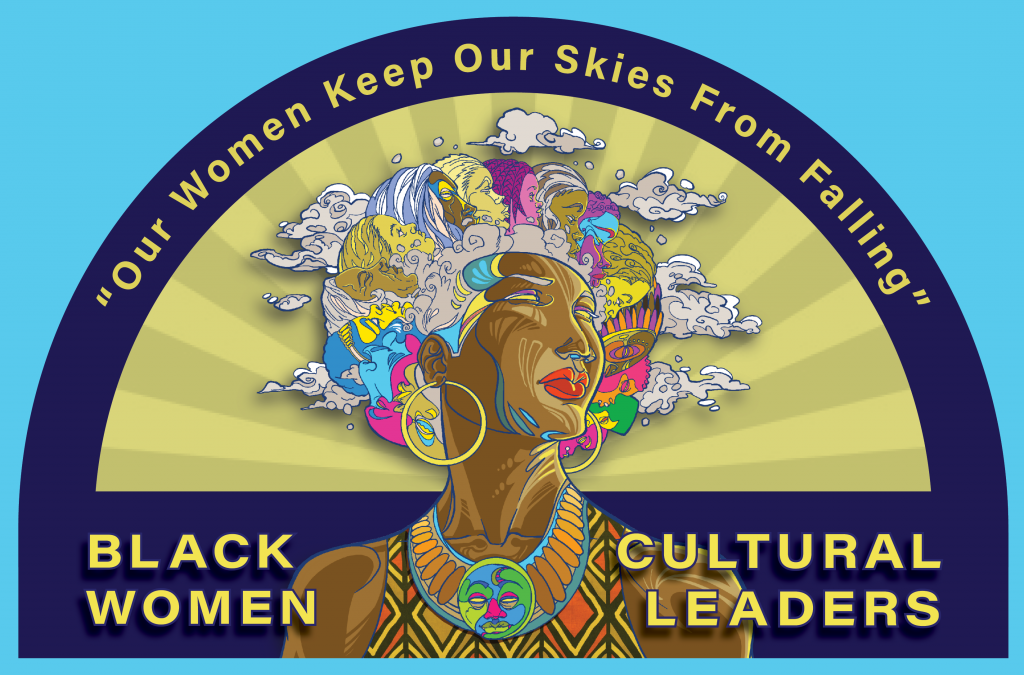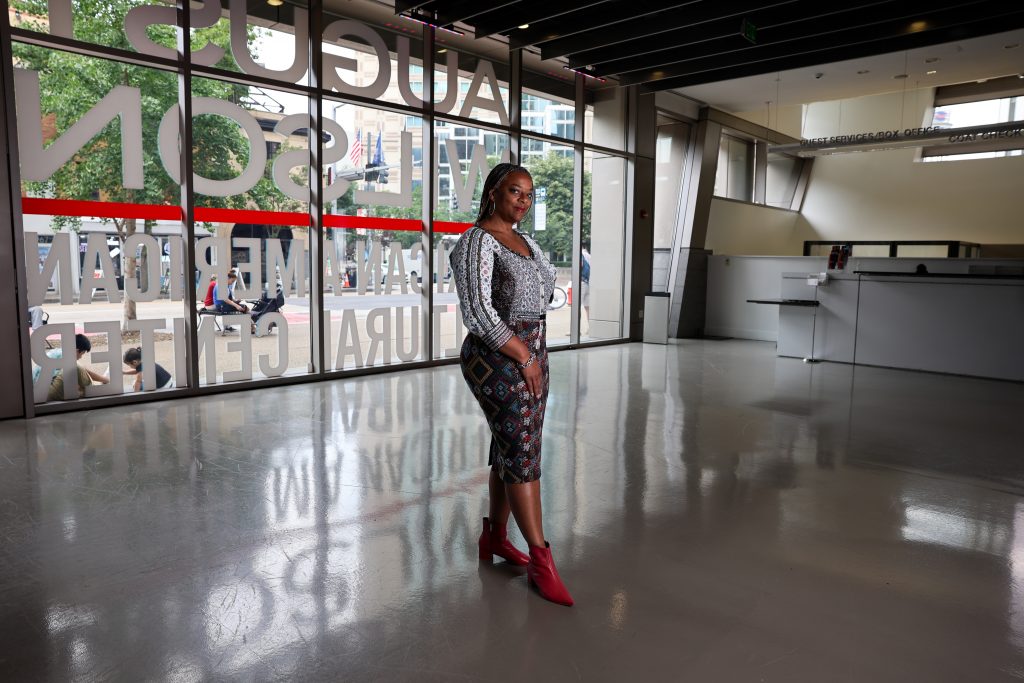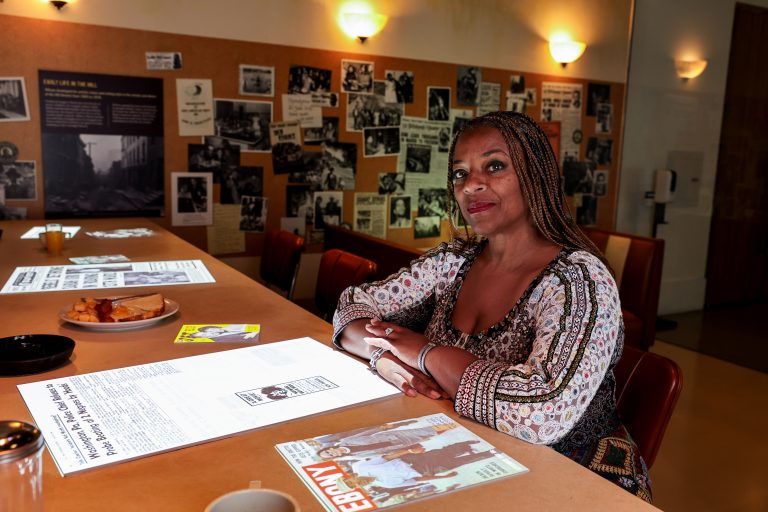The August Wilson African American Cultural Center President/CEO reflects on receiving and passing on cultural knowledge.
By Ervin Dyer, Madison Stokes and Obianuju Okoye
This interview is part of a series on Pittsburgh’s Black Women Cultural Leaders
Janis Burley Wilson is a native of Penn Hills, a suburban community east of Pittsburgh. She
graduated from the University of Pittsburgh in 1987 with a bachelor’s degree in rhetoric and communications and Hispanic language and culture. She had aspirations of being a newscaster on Spanish television. After an internship with Family Communications at WQED, she went back to Pitt for a master’s degree in elementary education. She worked for Pittsburgh Public Schools as an elementary and middle school teacher for several years. She was at American University in Washington, D.C., studying for a Ph.D. in education administration in 2002, when the opportunity came to move back to Pittsburgh and work for the Pittsburgh Cultural Trust. In addition to her work at the Pittsburgh Cultural Trust, Wilson launched the Pittsburgh International Jazz Festival in 2011.
In 2017, she became President/CEO of the August Wilson African American Cultural Center. Wilson (no relation) uses the role to honor the legacy of the center’s namesake, the Pulitzer Prize-winning playwright, August Wilson.
About two years ago, the Center opened its first permanent exhibition, “The Writer’s Landscape.” It’s an interactive display for all 10 of Wilson’s Century Cycle plays that chronicle each decade of the 20th century for Black Americans. But Wilson also sees the center’s work as noting the broader cultural narrative of Pittsburgh and the contributions of Black people across the African diaspora.
The Center was recently named one of Pittsburgh’s 16 Cultural Treasures and the support from The Heinz Endowments and the Ford Foundation helps to secure the Center as a home for arts, storytelling and the exchange of ideas related to the African American experience, she says.

Why do you do this work?
This opportunity to build, lead, and program a Black cultural center is such a privilege; to be able to bask in art and culture, and to work with some of the most creative people in the world is an honor.
Why is this work important in a city like Pittsburgh?
Pittsburgh has produced exceptional Black artists and business leaders and deserves to have a place where our culture and accomplishments are on display every day. The Center deserves to be supported, well-funded, and sustainable.
In the past year, what aspect of your work are you most proud of?
I’m proud of the growth of our audience and our reach. We present artists of international renown; we also nurture local artists and creatives. Our educational programming has expanded to provide live theater annually free of charge for students, and our community days welcome families from across the region.
What is the importance of cultural knowledge?
When we know how to use art and culture to express our thoughts, ambitions, fears, and purpose, we can teach others to do the same, just witnessing or experiencing art.
How did you learn this lesson—in what ways was cultural knowledge passed on to you?
As a young person music filled my home. Jazz especially. Learning about artists like Abbey Lincoln and Max Roach or Nina Simone taught me that art and culture is a vehicle for activism, beauty, and message. All of the artists we work with are telling us how they feel and what they dream about through their work. That’s powerful.
What was some of that cultural knowledge?
Art informs, inspires, and has no limits. Music, especially, transports us to other realms, and I use it daily to focus, as well as to escape.
What books are on your nightstand?
I have a lot of books on film, music, and fashion. I’m currently reading a children’s book on milliner Mae Reeves and another by journalist and music and cultural critic Greg Tate, who passed in 2021.
You’re on your way to your fantasy concert — who are you going to see?
Beach setting-Metropole Orchestra with Stevie Wonder (vocals/piano/harmonica), Jazmine Sullivan (vocals), 1980s Al Jarreau (RIP), Omar (British neo soul artist), Maya Andrade (Cape Verdean vocalist/percussion), Liane La Havas (British vocalist/guitar), Rakim (poetry), Chaka Khan (vocals), and Frank Ocean (vocals). Special guest instrumentalists are Nate Smith on drums, Sean Jones on trumpet, Bernard Edwards on bass (RIP), Michael Brecker on sax (RIP), and Jean Luc Ponty (violin)… I know, this is a lot.

Outside of a relative, what African American female cultural leader inspired you?
Mikki Shepard [former executive producer of the Apollo Theater].
What have you learned from her?
Everything…how to dream big and still infuse community into programming, while handling the business.
How do we empower/inspire the next generation of Black women’s leadership?
We show up, show support and be real. They know the difference. I am inspired by THEM. They make their own rules and are not waiting for permission.
What skills are needed most for the work that you do?
Flexibility, patience, stamina, hope, and refusal to take BS, condescension from anyone.
What would you like your cultural legacy to be?
I believe in using my sphere of influence to uplift other Black artists and creatives, administrators, and have created programs, hired people intentionally for that purpose, and tried to pass on what I know and learned, and shared the rewards I’ve garnered with my people. That can’t be disputed and I’m proud of the commitment I’ve made to sharing with others.
Do you have a cultural wish list for Pittsburgh?
I’m tired of Black organizations, artists, entities, having to perform or work harder to demonstrate success without the same tools and resources that other organizations, or artists entities are afforded.
Is there an overlooked, misunderstood, or unappreciated aspect of African American culture in Pittsburgh?
The overused “Black is not a monolith” still holds true.
Outside of your work, what are your passions?
I love to travel, I love being with my friends/family, enjoying music, cooking, watching my children thrive, making things happen.
What’s next for you?
I have no idea.
Ervin Dyer is a writer who focuses his storytelling on Africana life and culture.
Madison Stokes and Obianuju Okoye are with the Pittsburgh Black Media Federation’s Chris Moore Internship program.


